Ghana's rich history spans thousands of years, from ancient civilizations to colonial rule and eventual independence. The country's name originates from the medieval trading empire that flourished until the 13th century, approximately 500 miles northwest of modern-day Ghana ¹.
*Prehistoric Era*
The climate varied during the Pleistocene Epoch, affecting human settlement patterns. Archaeological findings reveal Late Chellean and Acheulean cultures, indicating human presence in the region ¹.
*Early Traditions*
The modern state's name is derived from the ancient empire, but its people's origins are unclear. Oral traditions suggest migrations from the north, northwest, east, and northeast, influenced by Islamic civilization and trade routes ¹.
*Trade Routes and Islam*
Trans-Saharan routes connected Ghana to Morocco, Tunisia, and Tripoli, facilitating trade and cultural exchange. The Mande states, including the empires of Ghana and Mali, and the Hausa states, played significant roles in this network ¹.
*Colonial Period*
Portuguese mariners arrived in 1471, initiating direct sea trade with Europe. The Gold Coast, as Ghana was known, became a hub for gold, ivory, and enslaved people. European powers, including the British, Dutch, and Danes, established forts and trading posts ¹.
*Independence*
Ghana gained independence in 1957, becoming the first Black African country south of the Sahara to do so. The country's path to independence was paved by leaders like Kwame Nkrumah, who played a key role in the nationalist movement ¹.
Would you like to know more about Ghana's history or specific aspects of its cultural heritage?Here's the continuation of the Ghana history article:
*Pre-Colonial Period (1400-1874)*
1. The Gold Coast: European traders established forts and trading posts, exploiting Ghana's gold resources.
2. Ashanti Empire (1670-1902): A powerful kingdom that resisted British colonization.
3. Other kingdoms: Fante, Ga, and Ewe states maintained autonomy.
*Colonial Period (1874-1957)*
1. British colonization: Ghana became a British colony in 1874.
2. Resistance and revolts: Ashanti and other kingdoms fought against British rule.
3. Economic exploitation: Ghana's resources were extracted for British benefit.
4. Infrastructure development: Railways, roads, and education systems were established.
*Independence Movement (1940s-1957)*
1. Nationalist movement: Led by Kwame Nkrumah, J.B. Danquah, and others.
2. Political parties: United Gold Coast Convention (UGCC) and Convention People's Party (CPP).
3. Independence: Ghana gained independence on March 6, 1957.
*Post-Independence (1957-1981)*
1. Nkrumah's rule (1957-1966): Pan-Africanism, socialism, and industrialization.
2. Military coups (1966-1981): Series of coups led to instability.
*Modern Ghana (1981-Present)*
1. Jerry Rawlings' rule (1981-2001): Economic reforms, democracy, and stability.
2. Democratic transition: John Kufuor (2001-2009), John Atta Mills (2009-2012), and Nana Akufo-Addo (2017-present).
3. Economic growth: Ghana's economy has grown, driven by oil discoveries and agriculture.
*Challenges and Opportunities*
1. Economic development: Ghana faces challenges in infrastructure, education, and healthcare.
2. Corruption: Efforts to combat corruption and promote transparency.
3. Cultural preservation: Protecting Ghana's rich cultural heritage.
*Key Figures*
1. Kwame Nkrumah: First president and independence leader.
2. J.B. Danquah: Nationalist leader and politician.
3. Jerry Raw




No comments yet
Be the first to share your thoughts!